Humanitarian Crisis
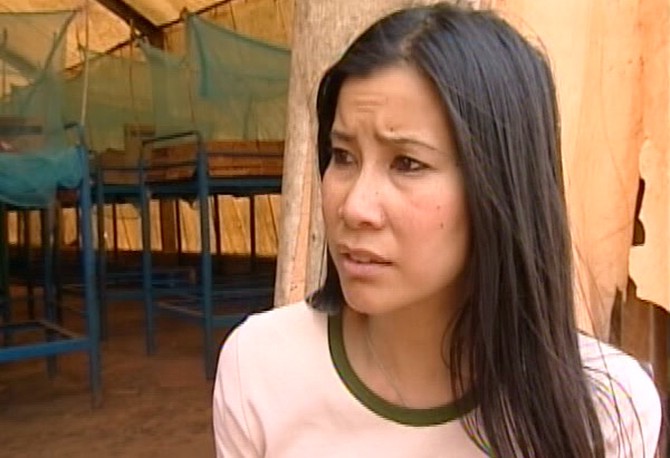
For two decades, a brutal Civil War has threatened the East African country of Uganda. The government has been fighting a rebel group called the Lord's Resistance Army—or LRA—led by Joseph Kony, an elusive man who reportedly believes that he is God.
On assignment, Oprah Show correspondent Lisa Ling learned about the horrors of the LRA, which many call one of the worst rebel movements on the planet. "The majority of the combatants in this rebel army are abducted children," Lisa says. "Most of them were kidnapped from their families." These abducted child soldiers often are forced to engage in rape, murder, kidnappings, cannibalism and torture. Those who refuse to commit these horrors may themselves be raped, murdered, tortured and kept as sex slaves.
At a home for former LRA soldiers, Lisa says she was stunned by the stories she heard. "Just think about the things that they've seen," she says. "If you just look at their faces, they just have looks of utter lifelessness."
On assignment, Oprah Show correspondent Lisa Ling learned about the horrors of the LRA, which many call one of the worst rebel movements on the planet. "The majority of the combatants in this rebel army are abducted children," Lisa says. "Most of them were kidnapped from their families." These abducted child soldiers often are forced to engage in rape, murder, kidnappings, cannibalism and torture. Those who refuse to commit these horrors may themselves be raped, murdered, tortured and kept as sex slaves.
At a home for former LRA soldiers, Lisa says she was stunned by the stories she heard. "Just think about the things that they've seen," she says. "If you just look at their faces, they just have looks of utter lifelessness."
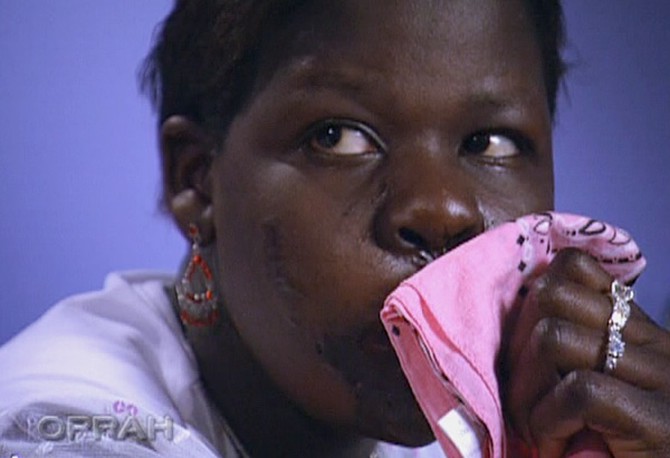
More than two years ago, Evaline was kidnapped from her home by LRA soldiers. Evaline says they came in the night and took her and many others from her area. For the next year, she says she was beaten regularly and forced to fight and work as a mule in her captors' army.
During one violent gunfight, a bomb dropped from a plane. One of the rebel commanders used Evaline as a shield, pushing her body in front of his own. When the bomb exploded, shrapnel tore into Evaline's face leaving her bleeding and disfigured. "I ran and fell under the trees," she says. "I was scared. I looked to my left and I saw two girls who were dead. One woman in front of me was also dying."
When the bomb hit her, Evaline tells Lisa, "I felt like I was dead. I wasn't breathing right. I was in severe pain."
During one violent gunfight, a bomb dropped from a plane. One of the rebel commanders used Evaline as a shield, pushing her body in front of his own. When the bomb exploded, shrapnel tore into Evaline's face leaving her bleeding and disfigured. "I ran and fell under the trees," she says. "I was scared. I looked to my left and I saw two girls who were dead. One woman in front of me was also dying."
When the bomb hit her, Evaline tells Lisa, "I felt like I was dead. I wasn't breathing right. I was in severe pain."
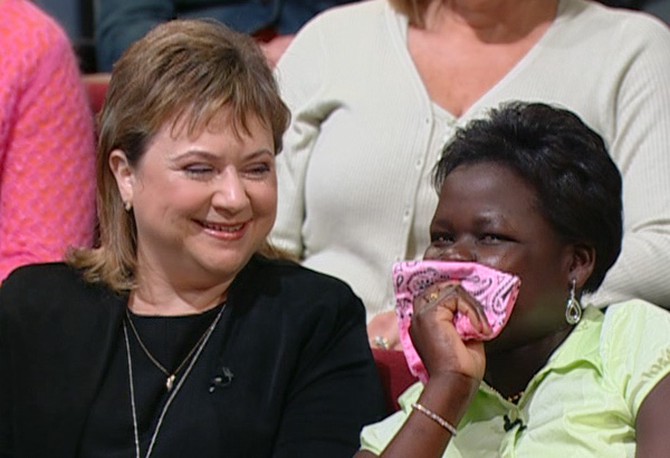
Evaline stayed for a week with no food or medicine in another LRA camp. The soldiers told her that if she could not walk, she would be killed. After she escaped, government soldiers found her on an abandoned battlefield and took her to a hospital.
Her injuries were so severe that she was unable to get the necessary treatment in Uganda. Children's Medical Missions heard of Evaline's tragic story and flew her to Ft. Wayne, Indiana. So far Evelyn has had four surgeries to reconstruct her face, with two more planned for before she goes back to Uganda.
Lynn, the woman in Indiana who has taken in Evaline while she receives treatment, says, "She's amazing. ... She has a very, very strong spirit."
Her injuries were so severe that she was unable to get the necessary treatment in Uganda. Children's Medical Missions heard of Evaline's tragic story and flew her to Ft. Wayne, Indiana. So far Evelyn has had four surgeries to reconstruct her face, with two more planned for before she goes back to Uganda.
Lynn, the woman in Indiana who has taken in Evaline while she receives treatment, says, "She's amazing. ... She has a very, very strong spirit."
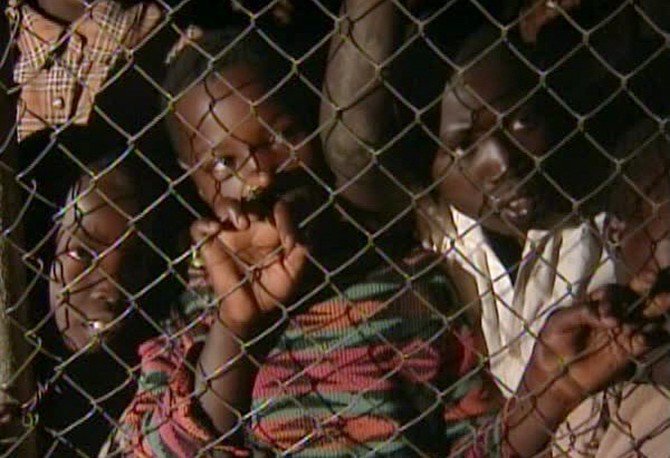
The threat posed by the violent LRA rebels in Uganda is so great that thousands of children join a nightly exodus. They leave their remote village homes just to avoid being kidnapped.
Known as the "nightwalkers," they walk—some for as long as two hours a night—to camps run by the Ugandan government and non-governmental organizations. Once there, the children agree to be locked in a cage and guarded from the marauding LRA. In the morning, the children return to their homes and work in the fields.
This nightly journey is so perilous that Lisa was warned that her safety could not be guaranteed if she joined them. At the facility she visited, Lisa saw 6,000 children locked in cages for their own safety. "The fact that these kids are running for their lives every single night is just unfathomable," she says. "This shouldn't be happening to children."
Known as the "nightwalkers," they walk—some for as long as two hours a night—to camps run by the Ugandan government and non-governmental organizations. Once there, the children agree to be locked in a cage and guarded from the marauding LRA. In the morning, the children return to their homes and work in the fields.
This nightly journey is so perilous that Lisa was warned that her safety could not be guaranteed if she joined them. At the facility she visited, Lisa saw 6,000 children locked in cages for their own safety. "The fact that these kids are running for their lives every single night is just unfathomable," she says. "This shouldn't be happening to children."
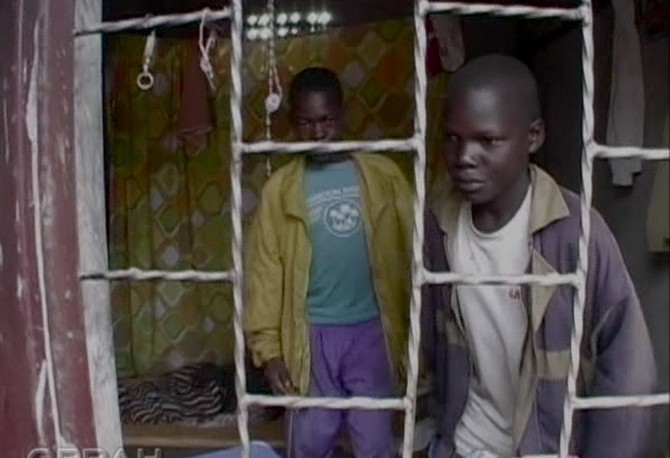
Bobby, Jason and Laren were college students from Southern California when they learned about atrocities against children in Africa. The three friends left the comforts of home and traveled halfway across the world to do some soul searching. During a trip to Uganda, they came face-to-face with the nightwalkers.
There they met Jacob and Thomas, brothers who had recently escaped from the LRA. The young boys were being hunted by their captors and were forced to hide in a small room during the day. At night, they slept next to hundreds of other nightwalkers in a bus park.
Jacob and Thomas didn't escape soon enough to save their other brother, whom Jacob says was murdered by the rebel army. When discussing their dead brother, Jacob's tears begin to fall. He tells Bobby, Jason and Laren that he'd rather die than live in these conditions.
While in Uganda, the three college students encountered thousands of children living like Jacob and Thomas. In one hospital, they saw 1,000 sleeping children crammed into two small rooms.
"Coming from a culture where the youth are exceptionally valued, we never realized so many children could go unseen...that so many beautiful faces could be invisible," Jason says.
There they met Jacob and Thomas, brothers who had recently escaped from the LRA. The young boys were being hunted by their captors and were forced to hide in a small room during the day. At night, they slept next to hundreds of other nightwalkers in a bus park.
Jacob and Thomas didn't escape soon enough to save their other brother, whom Jacob says was murdered by the rebel army. When discussing their dead brother, Jacob's tears begin to fall. He tells Bobby, Jason and Laren that he'd rather die than live in these conditions.
While in Uganda, the three college students encountered thousands of children living like Jacob and Thomas. In one hospital, they saw 1,000 sleeping children crammed into two small rooms.
"Coming from a culture where the youth are exceptionally valued, we never realized so many children could go unseen...that so many beautiful faces could be invisible," Jason says.
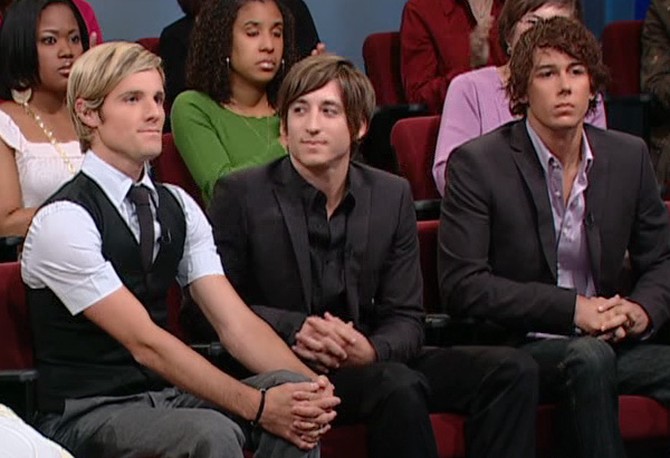
When Bobby, Jason and Laren returned to America, they turned their emotional video diaries from their journey into a documentary called Invisible Children. The students jumped into an RV and began traveling across the country, showing their film to as many people as possible.
Their efforts paid off. Bobby, Jason and Laren have raised more than $500,000 to help the children of Uganda, and now they're organizing a nationwide walk to rally more support. On April 29, 2006, people in 131 cities will participate in the Global Night Commute, a walk that mimics the nightly journey of Ugandan children. Participants will march en masse from one point to another and then sleep at their final destination.
Sign up for the Global Night Commute.
"Thousands and thousands of Americans have heard this story, and they're now taking action," Jason says. "They want to end this war."
Their efforts paid off. Bobby, Jason and Laren have raised more than $500,000 to help the children of Uganda, and now they're organizing a nationwide walk to rally more support. On April 29, 2006, people in 131 cities will participate in the Global Night Commute, a walk that mimics the nightly journey of Ugandan children. Participants will march en masse from one point to another and then sleep at their final destination.
Sign up for the Global Night Commute.
"Thousands and thousands of Americans have heard this story, and they're now taking action," Jason says. "They want to end this war."
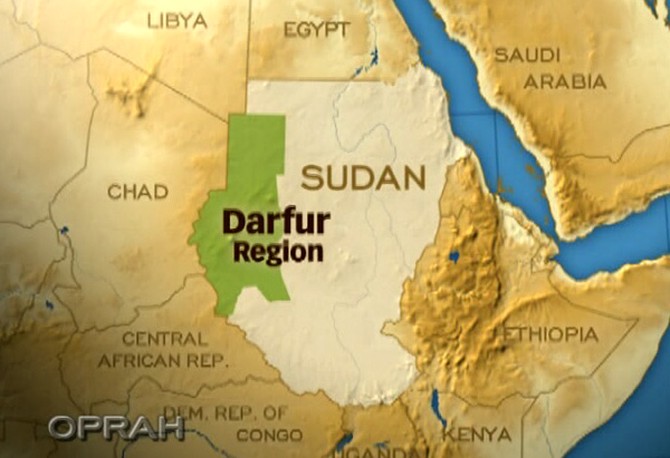
Sudan is a country in North Africa with a population of 40 million people. It has long been ruled by fundamentalist Islamic leaders who believe only those born of Arab descent are "pure Muslims."
Darfur—a region in the west of Sudan—is home to 6 million Muslims of African descent. For decades the African Muslims of Darfur were treated as second-class citizens, systematically kept powerless and impoverished.
In 2003, to protest the Arab-dominated government's abuse and oppression of the people of Darfur, African rebels attacked a military outpost. Two weeks later, the Sudanese government unleashed armed Arab tribal militias to kill not only those who planned the uprising, but to also wipe out their entire race. These murdering militias are known as the "Janjaweed"—which means "evil on horseback."
Over three years, the Janjaweed have torched villages, livestock and farms, gang-raped women and children, and slaughtered whole families in cold blood. Nearly 400,000 have died, and millions are homeless and on the brink of starvation. The U.N. calls the genocide in Sudan today's greatest humanitarian crisis.
Darfur—a region in the west of Sudan—is home to 6 million Muslims of African descent. For decades the African Muslims of Darfur were treated as second-class citizens, systematically kept powerless and impoverished.
In 2003, to protest the Arab-dominated government's abuse and oppression of the people of Darfur, African rebels attacked a military outpost. Two weeks later, the Sudanese government unleashed armed Arab tribal militias to kill not only those who planned the uprising, but to also wipe out their entire race. These murdering militias are known as the "Janjaweed"—which means "evil on horseback."
Over three years, the Janjaweed have torched villages, livestock and farms, gang-raped women and children, and slaughtered whole families in cold blood. Nearly 400,000 have died, and millions are homeless and on the brink of starvation. The U.N. calls the genocide in Sudan today's greatest humanitarian crisis.

George Clooney says he feels embarrassed that at one time he was not fully aware what was happening in Sudan. "I'm really slow to the Africa movement, I am ashamed to say," George says.
If you're slow to it as well, George says it's not too late to help end this genocide. George and his dad, Nick, a television news veteran, went to Sudan with the International Rescue Committee to learn for themselves what was happening.
George and Nick found a group of more than a thousand displaced families who had set up a village—but this was no refugee camp. "There were no tents to shelter them. Most just slept under trees. No food, no water," George says. "These people had jobs and property before the Arab Janjaweed militia burned their villages, raped their women and killed their children."
Since the government of Sudan won't allow anyone—not even U.N. officials—into Darfur, George and Nick continued on their journey to the Darfur-bordering country of Chad, which is itself in the midst of a coup. There they visited the Oure Cassoni refugee camp, home to 29,000 survivors of the genocide.
"There are scores of Oure Cassonis on both sides of the [Sudan-Chad] border. There are 2 million people away from their own homes," Nick says. "Time is running out."
If you're slow to it as well, George says it's not too late to help end this genocide. George and his dad, Nick, a television news veteran, went to Sudan with the International Rescue Committee to learn for themselves what was happening.
George and Nick found a group of more than a thousand displaced families who had set up a village—but this was no refugee camp. "There were no tents to shelter them. Most just slept under trees. No food, no water," George says. "These people had jobs and property before the Arab Janjaweed militia burned their villages, raped their women and killed their children."
Since the government of Sudan won't allow anyone—not even U.N. officials—into Darfur, George and Nick continued on their journey to the Darfur-bordering country of Chad, which is itself in the midst of a coup. There they visited the Oure Cassoni refugee camp, home to 29,000 survivors of the genocide.
"There are scores of Oure Cassonis on both sides of the [Sudan-Chad] border. There are 2 million people away from their own homes," Nick says. "Time is running out."
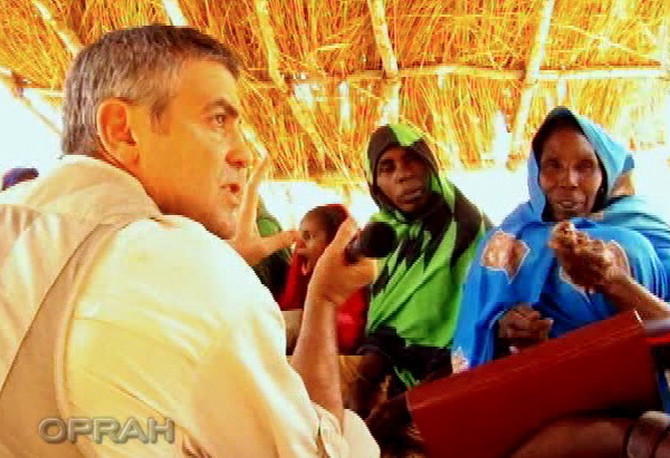
George says the situation in Sudan is grave. "We've all seen these images forever on television late at night. It's all of those things you imagine...and it's so much worse. There's absolute hopelessness," he says. "If you are lucky enough to get away from rape and murder and get to a refugee camp, there's security every night you have to worry about."
What is George's hope for this deeply troubled corner of the world? "Your hope is [that] they can have a decent night's sleep and some food and some shelter—just human dignities," George says. "I don't know if that's necessarily possible, but first and foremost I want whatever it takes to make them safe. That's our job as human beings."
"I would say our humanity is at stake in this crisis," Oprah says.
What is George's hope for this deeply troubled corner of the world? "Your hope is [that] they can have a decent night's sleep and some food and some shelter—just human dignities," George says. "I don't know if that's necessarily possible, but first and foremost I want whatever it takes to make them safe. That's our job as human beings."
"I would say our humanity is at stake in this crisis," Oprah says.
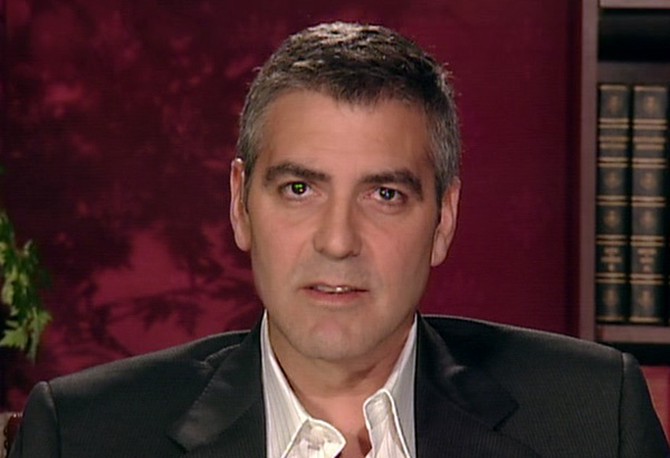
George admits that there are no easy answers available to the first genocide of the 21st century. Yet we all must try to make our voices heard.
"We're in a time right now where we're hard to outrage," George says. "We don't get up out of our chairs and do something—call a congressman, put in a call to the president."
You must do something, George says, to move world leaders to act. "The president wants to do this. He said, 'Not on our watch.' But he needs the political capital," George says. "This is not the United States' problem, it's the world's problem. So we need everyone to get out of their chairs to help."
George says you can register your views with The Save Darfur Coalition.
"We're in a time right now where we're hard to outrage," George says. "We don't get up out of our chairs and do something—call a congressman, put in a call to the president."
You must do something, George says, to move world leaders to act. "The president wants to do this. He said, 'Not on our watch.' But he needs the political capital," George says. "This is not the United States' problem, it's the world's problem. So we need everyone to get out of their chairs to help."
George says you can register your views with The Save Darfur Coalition.
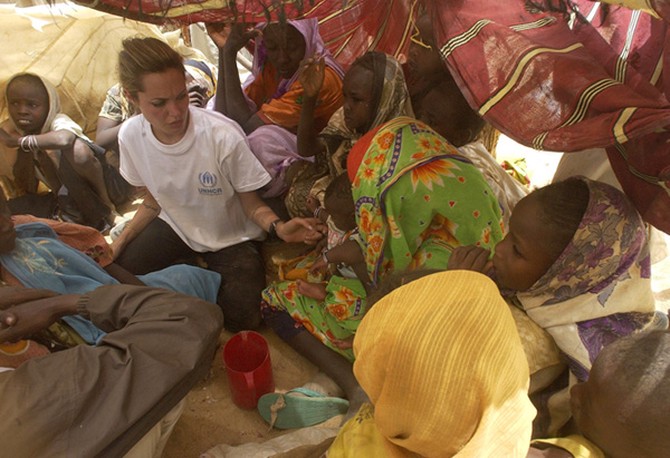
Photo credit: Edward Parsons/AP/Wide World Photos
Oscar®-winning actress Angelina Jolie took on the role of a lifetime when she became a Goodwill Ambassador for the United Nations High Commissioner for Refugees. As an ambassador, Angelina has made it her personal mission to raise awareness about the atrocities happening in the Sudan and around the world.
In April 2006, Angelina wrote a letter to USA Today and shared the "four facts Americans should know about Darfur."
In the letter, she writes: "I'm an actress and certainly no foreign-policy expert, but I've traveled to the region twice and believe that if Americans knew four simple facts that I've learned about Darfur, they would demand action from our government and would act themselves ... We can stop this but only if government leaders make it a high priority."
In April 2006, Angelina wrote a letter to USA Today and shared the "four facts Americans should know about Darfur."
In the letter, she writes: "I'm an actress and certainly no foreign-policy expert, but I've traveled to the region twice and believe that if Americans knew four simple facts that I've learned about Darfur, they would demand action from our government and would act themselves ... We can stop this but only if government leaders make it a high priority."
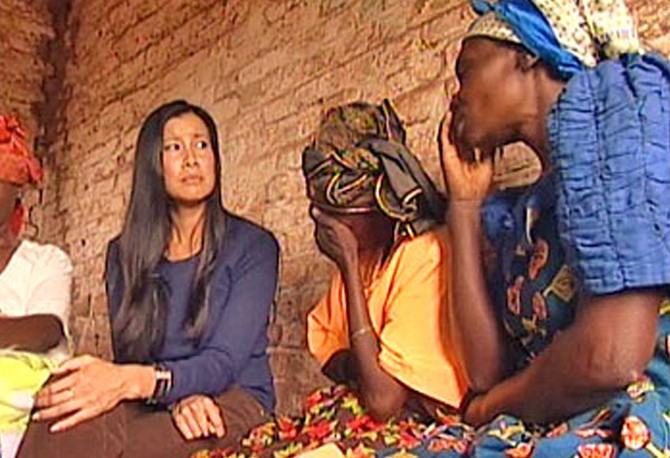
In January 2005, Lisa traveled to the Democratic Republic of the Congo to reveal what's happening to women in the middle of this war-torn nation. Lisa spoke to women in the village of Bukavu about the brutal beatings and unimaginable acts of sexual cruelty they suffered at the hands of the military.
Read the letters Congolese women sent to O, The Oprah Magazine.
For the first time, these brutalized women spoke up in hopes that the world would hear their voices and help end a war that's taken more than 4 million innocent lives.
Read the letters Congolese women sent to O, The Oprah Magazine.
For the first time, these brutalized women spoke up in hopes that the world would hear their voices and help end a war that's taken more than 4 million innocent lives.
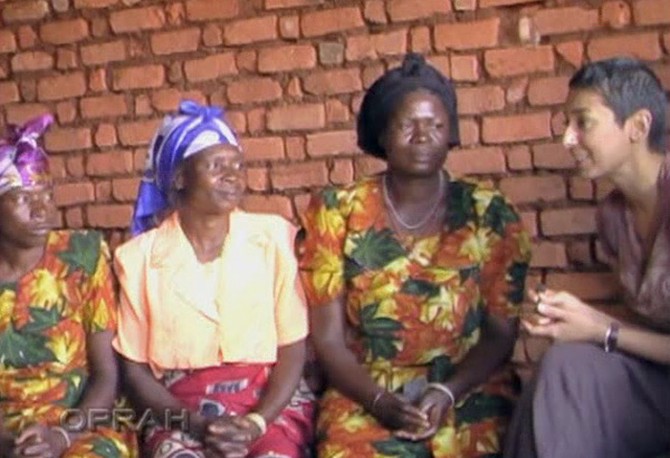
Zainab Salbi, president of Women for Women International, returns to the Congo to see how life has changed. The violence continues, but she says Oprah viewers are making a real difference.
Since Lisa's report, donations totaling almost $500,000 have helped more than 6,000 women. "Today our children are supported, our children can go to school, our children have clothes," one woman tells Zainab.
These contributions also support dozens of learning centers across the country. At these centers, Congolese women receive vocational skills training, women's rights training and counseling. Zainab says education has given these women the confidence and courage to speak out. "The difference is, they're breaking their silence. Instead of hiding in their homes, they are actually doing something about their lives," she says.
A survey of 600 women who've participated in the Women for Women International program reveals that 92 percent are now earning a living. Some say they are making as much as $120 a month, which is significant in a nation where workers typically earn 20 cents a day.
"We believe there is a businesswoman in every woman," Zainab says. "The beauty of what I'm seeing here is that there is hope in these women...their eyes are shining."
Since Lisa's report, donations totaling almost $500,000 have helped more than 6,000 women. "Today our children are supported, our children can go to school, our children have clothes," one woman tells Zainab.
These contributions also support dozens of learning centers across the country. At these centers, Congolese women receive vocational skills training, women's rights training and counseling. Zainab says education has given these women the confidence and courage to speak out. "The difference is, they're breaking their silence. Instead of hiding in their homes, they are actually doing something about their lives," she says.
A survey of 600 women who've participated in the Women for Women International program reveals that 92 percent are now earning a living. Some say they are making as much as $120 a month, which is significant in a nation where workers typically earn 20 cents a day.
"We believe there is a businesswoman in every woman," Zainab says. "The beauty of what I'm seeing here is that there is hope in these women...their eyes are shining."
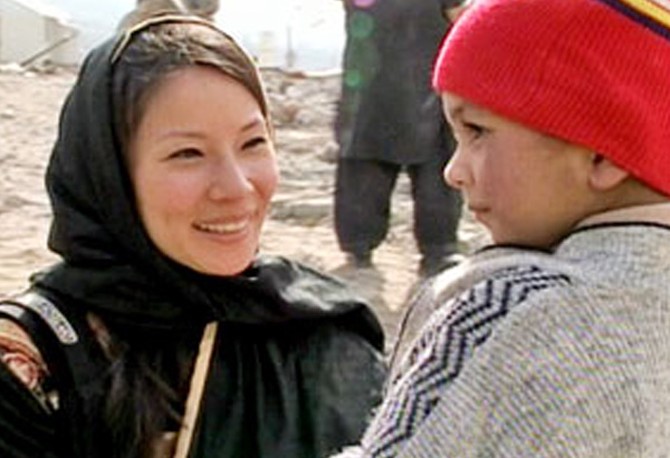
On the morning of October 8, 2005, one of the deadliest earthquakes in history struck the town of Balakot, Pakistan. In just 15 seconds, the entire city was reduced to a pile of rubble. Seventy thousand people died—half of them children—100,000 people were injured and 4 million are now homeless.
Actress Lucy Liu traveled to Pakistan to view the devastation firsthand. After her special report for the Oprah Show, donations poured in. To date, viewers have contributed almost $500,000.
Lucy says these donations will make a huge difference in the lives of earthquake survivors. The money will be used to buy 200 school tents, which accommodate a total of 8,000 students, and 570 "school in a box" kits that will help 50,000 children get an education. One thousand families will also receive purified water, wool blankets, medical kits and warm jackets.
"I'm eternally grateful," Lucy says. "And UNICEF is eternally grateful."
Actress Lucy Liu traveled to Pakistan to view the devastation firsthand. After her special report for the Oprah Show, donations poured in. To date, viewers have contributed almost $500,000.
Lucy says these donations will make a huge difference in the lives of earthquake survivors. The money will be used to buy 200 school tents, which accommodate a total of 8,000 students, and 570 "school in a box" kits that will help 50,000 children get an education. One thousand families will also receive purified water, wool blankets, medical kits and warm jackets.
"I'm eternally grateful," Lucy says. "And UNICEF is eternally grateful."
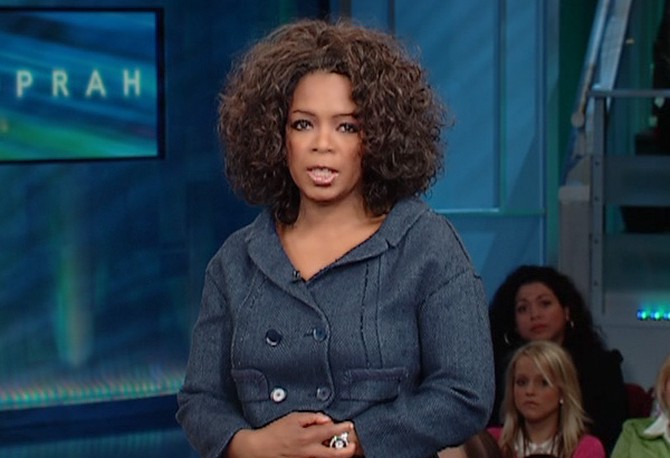
Ever since Oprah heard about the genocide happening in Sudan and Uganda's young nightwalkers, she says she's had trouble sleeping at night.
"There is a holocaust going on right now in Africa," Oprah says. "Everybody who hears it today, can no longer say, 'I didn't know that was going on.' ... Maybe you feel like you have no real power to change anything, but the truth is, you are the only hope that all of these people have."
Oprah hopes that viewers will "rise up against the madness" and help stop the atrocities happening in Africa. "If we don't listen and do something now, we're all going to have blood on our hands ... If this was happening to your child, wouldn't you want the world to help?" she asks.
To lend a helping hand support, Oprah urges you to support organizations working in Africa.
"There is a holocaust going on right now in Africa," Oprah says. "Everybody who hears it today, can no longer say, 'I didn't know that was going on.' ... Maybe you feel like you have no real power to change anything, but the truth is, you are the only hope that all of these people have."
Oprah hopes that viewers will "rise up against the madness" and help stop the atrocities happening in Africa. "If we don't listen and do something now, we're all going to have blood on our hands ... If this was happening to your child, wouldn't you want the world to help?" she asks.
To lend a helping hand support, Oprah urges you to support organizations working in Africa.
Published 04/26/2006

